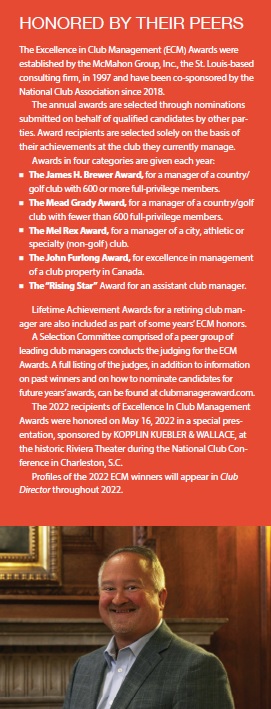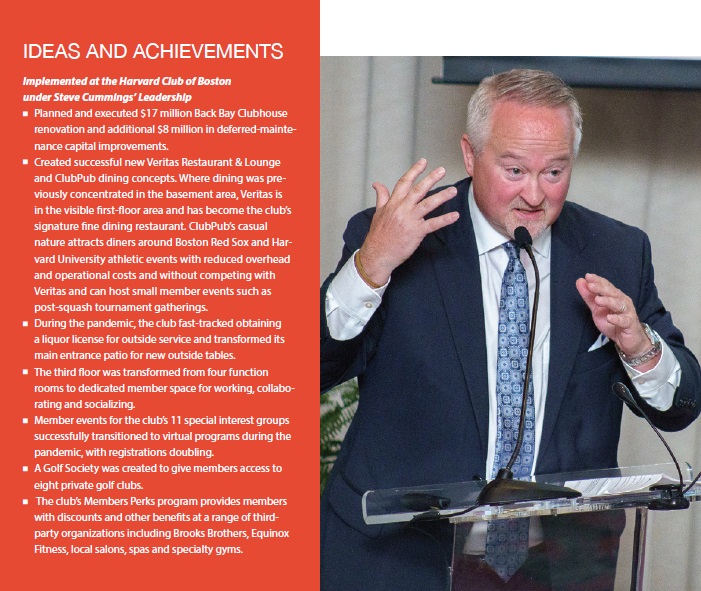For Steve Cummings, CCM, CCE, of the Harvard Club of Boston, “creative consistency” has been the driving principle behind his career success— and Excellence in Club Management honors.
All club managers—and those in city clubs in particular—had to navigate a course strewn with a sudden and steady stream of unimagined obstacles as the pandemic took hold in March 2020.
“There was no playbook—it was a case of making one up as you go,” says Steven P. Cummings, CCM, CCE, general manager of the Harvard Club of Boston (HCB) in Boston, Mass. “We only had a day to prepare from when we first started hearing about [Coronavirus] to when we were shut down by the governor and mayor. From there, it was a case of taking on one unique chal- lenge after another and rethinking every aspect of the club and how it operated.”
Cummings’ leadership in helping to steer the Harvard Club through what club President Matt Hegarty called “a crisis never seen in our 114-year history” had a strong influence on his selection by a peer group of managers for The Mel Rex Award, as part of the 2022 Excellence in Club Management® (ECM) Awards co-sponsored by the McMahon Group and National Club Association.
Hegarty wrote when nominating Cummings for ECM recognition that when the pandemic began, “HCB was in an existential crisis—the clubhouse was closed, we had no function income and dues revenues were severely cut back by members taking leaves of absence.” Two years later, he reported, the club had “$4.6 million in the bank, a growing membership, and an abundance of optimism—[and] this would not have happened without [how] Steve kept the club and operation together.”
An Impact from Day One

As impressive as Cummings’ performance has been during the past two years at HCB, it only comprises a portion—one-fifth, to be exact—of the contributions he has made to help preserve the storied club and set a bright course for its future as it entered its second century. December 2022 will mark the 10-year anniversary of when Cummings became HCB’s general manager—and the situation when he arrived in 2012 was even more dire than what arose with the onset of the pandemic.
“When Steve came to the club, we had about $250,000 in the bank and a clubhouse where routine maintenance and upkeep had been ignored for over a decade,” Hegarty recounted in his ECM nomination. “Under his leadership, we negotiated a sale of property, and with the proceeds and bank loan underwent an aggressive $17 million capital project that invigorated not only our physical plan, but also our member engagement. “This effort, along with operational efficiencies [that were implemented], led to the club’s best financial performance in the past generation by the end of fiscal 2019,” Hegarty continued. “Under less skilled leadership, our club could have failed in executing this exceptional turnaround. [But] under [Steve’s] leadership, our club’s achievements have been utterly transformational, making our an organization that is emblematic of Harvard [University] in the 21st century, while remaining true to our past and an example to others in the hospitality industry.”
Unafraid of Change
Perhaps most impressive is that Cummings even chose to seek out and take on the challenges that came with his move to the Har- vard Club 10 years ago. His resume at the time showed a steady progression through private club management positions, after graduating from the University of New Hampshire with a degree in hotel administration, and beginning his career with the Dunfey Hotel Corporation as a management trainee.
For the 24 years just prior to moving to the Harvard Club, Cummings was general manager of the well-respected Brae Burn Country Club in Newton, Mass. In all, he had spent more than 35 years at private country clubs, reflecting a love of golf that was sparked when he first began caddying at a small resort in the White Mountains region of his native New Hampshire at age 14.
So why would he want to leave golf behind and move to a city club—especially one with the financial and operational challenges that existed at HCB and with daunting prospects of working for a membership comprised of those affiliated with one of the world’s most prestigious universities?
“That’s a good question,” Cummings acknowledges. But where he was concerned, it was never really a question, because the opportunity fit with what had driven him throughout his career.
“I had always said I would be interested in the Harvard Club as a Boston-corridor job,” he explains. “I was ready for a new landscape and saw it as an opportunity to continue to learn. And I was actually intrigued by the idea of working with Harvard graduates.”
Cummings’ decision to make the move to HCB—and the success he has since had in his 10 years there—also reflects what he cites as core principles of “excellence in club management.”
“It’s about staying educated, motivated and creative,” he says. “You just can’t sit back on what you’ve done.
“It sounds like an oxymoron, but you need to strive for creative consistency, where you’re constantly looking to bring new amenities and experiences to your membership,” he adds. “You also have to be open to welcoming new technology and to finding ways to use data to help with your decision-making.”

Much More to Come
Even with ECM recognition now added to his accomplishments, Cummings has no intention of resting on his laurels. In fact, he’s already well into tackling what could rank as the biggest challenges he’s taken on at the Harvard Club.
“We have a lot more to do,” he says. “This is a slow-moving cruise ship, and it takes a lot to get it turned around.”
One holdover challenge from the pandemic is continuing to restore HCB’s membership levels while also addressing demo- graphic issues. “We had positive membership growth up until 2020, but then lost 17%,” Cummings explains. “We’ve gotten back 5% [to a current level of more than 4,200], but it’s still very skewed to [older age segments].” A Harvard graduate has been hired as a new senior director of marketing, Cummings reports, to “drill into what the sweet spot is for [younger candidates]” and spearhead other new recruitment initiatives.
The most ambitious facility project in Cummings’ tenure at the club is also quickly gaining momentum.
“We have a project that is in the permitting stage with the city of Boston,” he says. “The annex to our main clubhouse, which includes squash courts and locker rooms on multiple levels, is not handicapped-accessible, and the cost to make it accessible is extraordinary. So we started looking at development opportunities and formed a partnership with a developer to plan an approximately $135 million project that would raze the existing building and put up a new 11-story building.
“We’d have 20,000 square feet to ourselves for space that would include a new locker room, squash complex and fitness facility,” he adds. “There would be about 100 luxury apartments above that and a rooftop amenity we would own and operate. We also have the last surface parking lot on our street, and there’s a plan to build an underground/above-ground garage with another 30 apartments.
“We’d do it through a 75-year ground lease, after which the club will take back all the assets,” Cummings says. “So for our share, we’re getting about $30 million in new facilities and also getting some cash payments from the ground lease.
“It’s going to be about an 18-month to two-year project and there’s a lot of work to do to find temporary squash facilities and solve parking issues—the plan is to be open completely during the renovation. But it’s pretty exciting.”
Potentially even more exciting in terms of what it could mean for new exposure and accessibility for the club is a $1 billion civic-development project designed to dramatically change the landscape of Boston’s Back Bay neighborhood, where the Harvard Club is located. The retail/public park complex, which is being built directly over the Massachusetts Turnpike, would include a CitizenM hotel directly across the street from the club.
The project would “create a whole new gateway into the city, and bring more foot traffic and potential new members,”
Cummings says. “Additionally, CitizenM is not in the function or meeting business, so there are certainly opportunities there, too. It’s going to take a lot of work [to be completed as planned], but if it happens, it’s going to be great for the club.”
Giving Back
Amid all that has continued to fill his plate, Cummings has also found time to help groom the next generation of club managers, teaching a course in private club management at the Boston University School of Hospitality Administration.
“It’s a 12-week course that touches on every department [of club operations],” he says. “I can’t get in-depth when covering grounds maintenance one week and F&B the next, but I try to provide real-life examples and show how those areas are different, compared to hotels or resorts or public restaurants.”
At the same time, Cummings strives to highlight the advantages of working in a club environment versus the other hospitality- career options—advantages he thinks have grown larger as the world tries to emerge from the pandemic.
“I do a little bit of a sales job,” he admits. “I point out the stability of working in clubs, and how you can make a good living and stay in the same place for many years, without having to deal with headaches like overselling, or worry about needing to always move to advance in your career. “I tell them about my own experiences and encourage them to give it a shot,” he says. “Hopefully that will help to keep bringing fresh new talent into our business.


